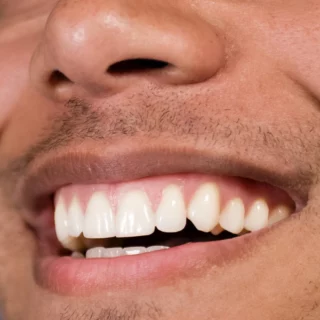This website uses cookies so that we can provide you with the best user experience possible. Cookie information is stored in your browser and performs functions such as recognising you when you return to our website and helping our team to understand which sections of the website you find most interesting and useful.

How can you tell if you have gum disease?
October 30, 2020The 9 tell-tale signs of gum disease
90% of UK adults suffer from gum disease.
Gum disease is caused by a buildup of bacteria on your teeth, where plaque acts as a hotbed for this bacteria. If left unmanaged, gum disease can cause quite severe symptoms, developing slowly without you noticing.
Your gums are a good indicator of your oral health and health at large. Gum disease itself can even heighten your risk of diabetes, heart disease, or even a stroke later in life.
The 9 leading signs of gum disease
For most of us, gum disease causes zero pain and zero discomfort. This, however, does not mean it can be ignored. If you allow it to develop, it can lead to periodontitis – the much more severe cousin of gum disease – which can cause you to lose your teeth and weaken your jaw. Here are the 9 tell-tale signs that you could be suffering:
- Bleeding gums
If you often see blood on your toothpaste or in the sink when you spit out, you may think nothing of it. But bleeding when you brush is one of the leading signs of gum disease.
The bleeding happens because your gums are sensitive, as they have been weakened by the buildup of bacteria (plaque) on your teeth. Flossing can be an uncomfortable experience for those who suffer with bleeding gums. The NHS advises that we floss even if it’s uncomfortable or causes some gum bleeding. The bleeding will stop as soon as your gums are healthier. - Tender or red gums
If your gums aren’t bleeding, but are tender or red at all during the day, this is another tell-tale sign of gum disease. This tenderness or redness may not even cause discomfort, but it is a sign you need to address your oral health. - Receding gums
Do your teeth look longer than they did before? This is normally caused by a receding gum line. Unfortunately, your gums can’t grow back, so you need to take action before it becomes serious. If your gums are receding, pay the dentist a visit. Your hygienist will remove bacteria from your teeth, but then it’s up to you to follow the routine you need to keep bacteria at bay. - Bad breath
Bad breath is not fun for you or those around you. But it is not always caused by strong-smelling or spicy foods and drinks. Any buildup of bacteria and pus in your mouth is likely to create an unpleasant smell. If you suffer from bad breath, even after you’ve brushed and flossed, it could be a sign of gum disease. - Loose teeth
After losing your baby teeth (deciduous teeth), you should not experience looseness from your teeth. If you do, this is another sign of gum disease. Where the gum has receded, your teeth are offered less support, which causes them to move around. - Changes in how your teeth sit together
If you notice any teeth ‘shifting’, it could be another sign that your gums are beginning to recede. - Visible pus around your teeth and on your gums
Pus is likely to be the natural result of a dental or periodontal abscess. This is caused by bacterial infection. Bacteria buildup causes your gums to recede. - Pain when chewing food
If you get pain when chewing, either a dull pain or sharp pain, then that could be another sign of gum disease. This can be another sign of your teeth being loose. - Sensitive gums and teeth
In the summer, does the thought of biting into an ice lolly make you grimace? Or do you always wait for your hot drinks to cool before taking a sip due to periodontal discomfort? This could be another tell-tale sign.
What can you do to manage gum disease?
If you have gum disease, it’s incredibly important to manage it. If you act early enough, you can begin to reverse the effects. However, when gum disease develops, its effects are irreversible.
To stop your gums from becoming tender, sensitive and eventually receding, you need to follow an effective oral health care routine. This includes brushing twice per day, with a brush that’s less than three months old, and flossing regularly.
Floe is the subscription service that makes sure you have everything you need to follow an effective oral health care routine. It means you can adopt a preventative routine to protect from gum disease with minimal effort.
For patients suffering from gum disease, dentists recommend using an ultra-soft toothbrush (such as our Curaprox 5400), and using an effective fluoride toothpaste. This is all included in the Floe subscription box. All you need to do is arrange your appointment with your dentist and hygienist.
Bitesize news direct to your inbox.
Sign up for Bitesize, our monthly newsletter, for the latest dental tips, healthcare news and more, including 25% off your first box



